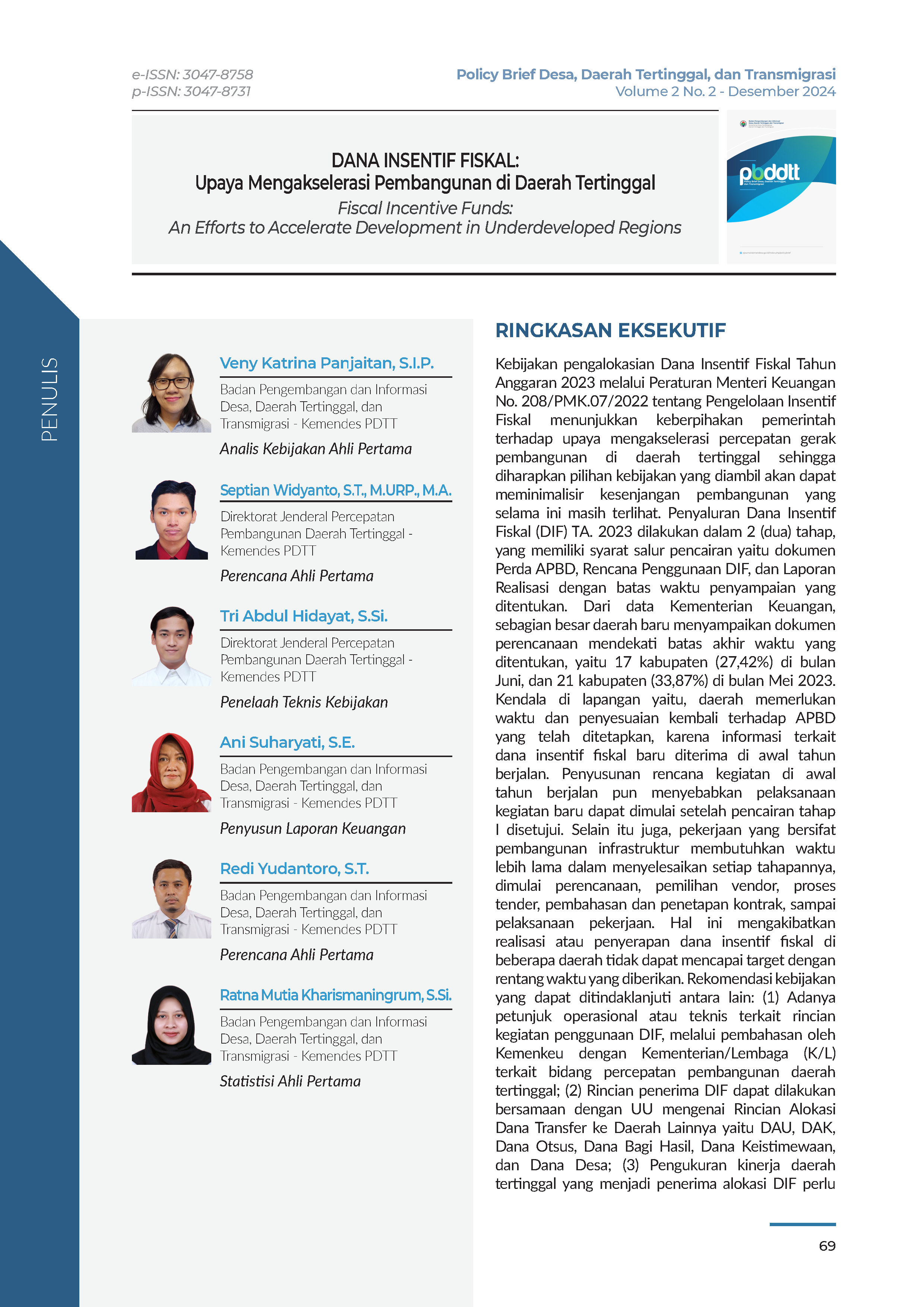Fiscal Incentive Funds
An Efforts to Accelerate Development in Underdeveloped Regions
Keywords:
disadvantaged regions, distribution requirements, fiscal incentive fundAbstract
Fiscal Incentive Fund allocation policy for 2023 through Minister of Finance Regulation Number 208/PMK.07/2022 concerning the Management of Fiscal Incentives shows the government's support toward the efforts to accelerate the acceleration of development in underdeveloped areas. By this regulation it is hoped that the policy choices taken will be able to minimize the development gaps that are still visible. The distribution of Fiscal Incentive Funds for 2023 is carried out in 2 (two) stages, which has disbursement channel requirements, namely the Regional Revenue and Expenditure Budget Document, Fiscal Incentive Funds Action Plan, and Realization Report with a specified submission deadline. The data from Ministry of Finance shows that the majority of regions only submitted planning documents close to the specified deadline, those are 17 districts (27.42%) in June, and 21 districts (33.87%) in May 2023. Obstacles in the field are, each district require more time and readjustments to the Regional Revenue and Expenditure Budget that has been determined. It happened since the information regarding fiscal incentive funds was only received at the beginning of the current year. The preparation of activity plans at the beginning of the current year also means that implementation of activities can only begin after phase I disbursement has been approved. Apart from that, infrastructure development work takes longer to complete each stage, starting from planning, selecting vendors, tendering processes, discussing and establishing contracts, to implementing the work. This resulted in the realization or absorption of fiscal incentive funds in several regions not being able to reach the target within the given time frame. These are the policy recommendations that can be followed up, including: (1) There should be an operational or technical instructions regarding details of activities for using Fiscal Incentive Funds, through discussions by the Ministry of Finance with Ministries/Institutions (K/L) related to the field of accelerating the development of underdeveloped areas; (2) The Details of Fiscal Incentive Funds recipients can be carried out at the same time as the Law regarding Details of Allocation of Transfer Funds to Other Regions, namely General Allocation Fund, Specific Allocation Fund, Special Autonomy Funds, Profit Sharing Funds, Special Funds and Village Funds; (3) For measuring the performance of disadvantaged areas that are recipients of Fiscal Incentive Funds allocations needs to involve other related ministries/institutions; (4) It is necessary to form a special task force in the region or become part of the duties of the Regional Government Budget Team in the Fiscal Incentive Funds recipient area to assist with administrative requirements, execution of activities in the field, as well as to carry out consultations if there are obstacles in implementation; (5) The allocation of Fiscal Incentive Funds is not limited to infrastructure, but also to other strategic activities and is considered a priority for the welfare of disadvantaged areas; (6) The determination of criteria in performance measurement still takes into account the special characteristics of underdeveloped areas; (7) Socialization needs to be carried out regarding regional provisions that can receive Fiscal Incentive Funds based on performance measurement, so that all regions receive information and can act as a trigger for regions to improve their performance.
Downloads


